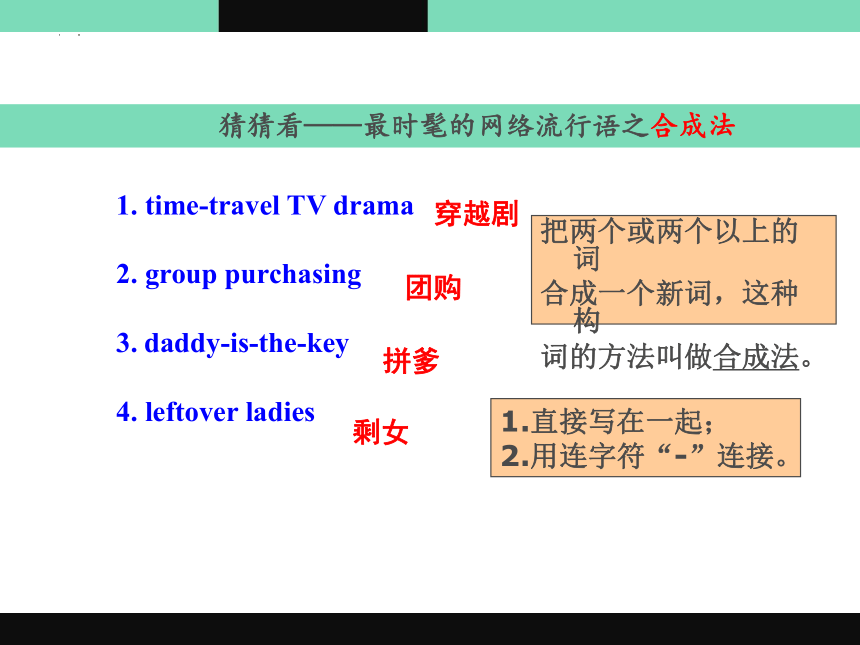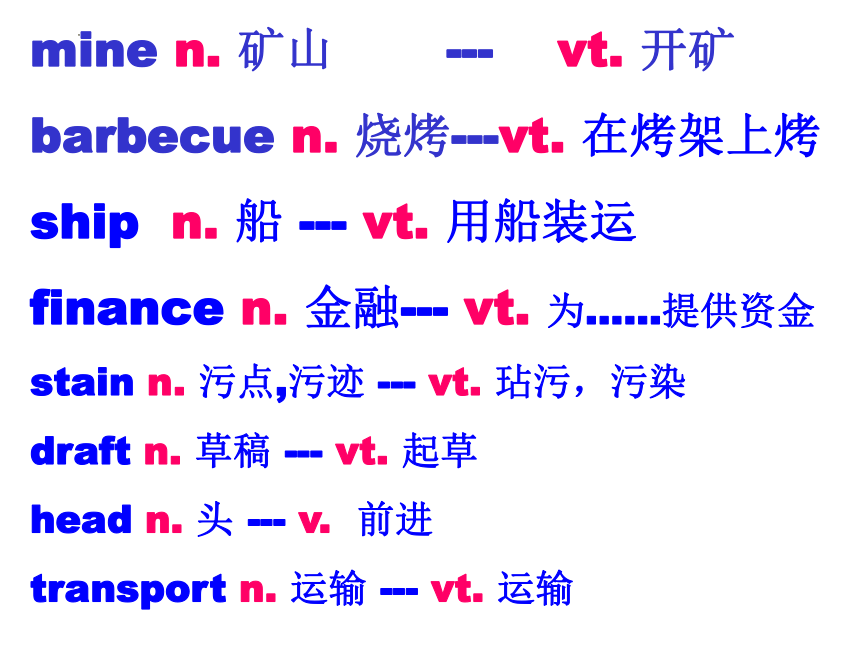2024届高考英语复习构词法课件(共45张PPT)
文档属性
| 名称 | 2024届高考英语复习构词法课件(共45张PPT) |  | |
| 格式 | pptx | ||
| 文件大小 | 674.4KB | ||
| 资源类型 | 教案 | ||
| 版本资源 | 通用版 | ||
| 科目 | 英语 | ||
| 更新时间 | 2023-07-08 08:18:36 | ||
图片预览












文档简介
(共45张PPT)
英语构词法
构词法
在语法填空中的应用
1. time-travel TV drama
2. group purchasing
3. daddy-is-the-key
4. leftover ladies
猜猜看——最时髦的网络流行语之合成法
拼爹
穿越剧
团购
剩女
把两个或两个以上的词
合成一个新词,这种构
词的方法叫做合成法。
1.直接写在一起;
2.用连字符“-”连接。
猜猜看——最时髦的网络流行语之转化法
5.被雷倒(到)了 in shock /shock sb
6.淡定 keep calm /calm down
转化法:不添加任何成分,不改变词形,把一个词由一种词类转用为另一种词类的方法叫转化法。
7. disclose one’s secret
8. Microblog
9. It’s all floating cloud.
10. envious, jealous and hateful
.
猜猜看——最时髦的网络流行语之派生法
神马都是浮云
微博
爆料
前缀:一般只改变词义,不改变词类
后缀:一般只改变词类,不引起词义变化
羡慕嫉妒恨
构词法
合成 (Compounding)
派生(Derivation)
【前缀/后缀】
转化(Conversion)
【词性转换】
{
英语构词法主要有三种:
转化、合成与派生。
英语构词法种类
另外还有截短、缩合等。
1. 转化 :
是指有一种词类转化为另一种词类。
water n. 水 ------ water vt. 浇水
常见的转化形式两种:
动词 --- 名词
名词 --- 动词
动词----名词
stop vt. 停止 --- n.车站
love vt. 爱 --- n. 爱
Watch vt. 观看 --- n. 手表
record vt. 录音 --- n. 纪录
comb vt. 梳理(头发) --- n. 梳子
abuse vt. 辱骂 --- n. 辱骂
名词 ---- 动词
hand n. 手 --- vt. 上交
seat n. 座位 --- vt. 坐
nurse n. 护士 --- vt. 护理
oil n. 油 --- vt. 上油
time n. 时间 --- vt. 定时,测时
shoulder n. 肩膀 --- vt. 肩负
mine n. 矿山 --- vt. 开矿
barbecue n. 烧烤---vt. 在烤架上烤
ship n. 船 --- vt. 用船装运
finance n. 金融--- vt. 为……提供资金
stain n. 污点,污迹 --- vt. 玷污,污染
draft n. 草稿 --- vt. 起草
head n. 头 --- v. 前进
transport n. 运输 --- vt. 运输
副词 --- 动词
down adv. 向下
--- v. 放下
副词 --- 名词
nowhere adv. 任何地方都不
--- n. 无处,无名的地方
形容词 --- 名词
freezing adj. 冰冻的 --- n. 冰点
solid adj. 固体的,坚实的--- n. 固体
数词 --- 动词
second num. 第二 --- v. 赞成
--- n. 秒
2. 合成 :
有两个或更多的词合成一个词。
class 班级 + room 房间 = classroom 教室
warm + heart + ed = warmhearted 热心肠的
good + looking = good-looking 相貌好看的
hard + working
= hard-working 勤劳的
peace-loving
state-owned
well-known
ready-mades
sightseeing
bloodthirsty
3. 派生 :
是通过在词根上加前缀或者后缀构成一个新词。
happy --- unhappy
develop --- development
前缀一般只引起意思上的变化而不造成词类的变化,只有少数能引起词类的变化。
mis- 错误的 + understand v. 理解
--- misunderstand v. 误解
en + large adj. 大的 --- enlarge v. 扩大
后缀一般只引起词性上的变化而不造成意思的变化。
care v. 照料
--- careful adj. 细心的
work v. 工作
--- worker n. 工人
常见的前缀
(A)表示否定的前缀:
un-unfair,unhappy
non-nonsmoker
(常用在n. adj. adv. 前)
in-inactive, inhuman, indirect
(常用在adj.后)
dis-disagree,disappear
im-impolite,impossible
(用在b,p,m 开头的词前)
il-illegal
ir-irreal, irregular
(B).表示错误或失当的前缀:
mis-misjudge, misdirect(误导)
(C).表示向背的前缀:
pro-(亲,支持)
pro-Chinese, pro-American
anti-(阻止,抗)
antiwar, anti-Japanese war
(D).表示程度、大小的前缀
super-
superstar,supermarket,
superman, superpower
over-
overhead, overeat, overuse
mini-
minibus, miniskirt, mini-car
under-
underground, under-develop
semi-(半,部分)
semicircle, semiskilled, semi-steel
(E).表示时间的前缀
pre-
prewar
post-
postwar
fore-(前,预先)
foretell,
forecast, foresee,
weather forecast
(F).表示方位的前缀:
sub-
subway, submarine
inter-
international, intercity,
interclass
trans-(横过,通过,超越,进入)
translate,
transatlantic
常见的后缀
1.动词变名词:
-ation
satisfaction,
education,
realization
-ment
development,
movement,
disappointment
-al
arrival, refusal
-ee
trainee, employee
-er
teacher, worker
-or
visitor, sailor
2.形容词变名词
-ness
happiness,
meanness, carelessness
-ity
ability, possibility
-ism
Marxism, criticism
3.名词变形容词:
-y
windy, rainy, sandy
-ish
foolish, feverish
-some
handsome, troublesome
-ous
dangerous, humorous
-ful
helpful, careful, peaceful
3. 名词、形容词变动词:
-ify
beautify, simplify
-ize
realize
-en
quicken, widen, sharpen
但也有一些带后缀的派生词仅仅改变词义:
Kingdom: “职位、状态” freedom
Boyhood: “身份,资格” childhood
Friendship:情态\状态\性质\身份\职业\技巧\技
能” leadership, hardship
Spoonful:构成名词mouthful(满口,一口),
handful(一把)
4. 截短 :
是指用截头取尾的方法构成新词。
telephone --- phone
influenza [ influ enz ] --- flu.
流行性感冒
5. 缩合 :
是指把两个或两个以上的词各取一部分合在一起构成一个新单词。
smoke and fog ---- smog 烟雾
Test of English as a foreign language
– TOEFL 托福
International English language test system
- IELTS 雅思
实景体验—真题回顾
However, be (care) not to go to extremes.
(全国卷 ,2017)
Steam engines are used to pull the carriages and it must have been (fair) unpleasant for the passengers, with all the smoke and noise.(全国卷П,2017)
She is determined to carry on with her (educate).
It is (certain) fun but the lifestyle is a little unreal.
(全国卷Ш,2017)
先分析句子结构,再判断要填的词在句子充当什么成分;
然后思考充当这一成分需要哪类词,最后决定如何将其转换成所需词类.
关于充当句中各成分的最典型的词类,请记住以下三条:
1.作主语或宾语要用名词,如上述第3、5、9题。
2.作定语、表语或补足语一般用形容词,如上述第1、9题。
3.修饰动词、形容词或另一副词,作状语,用副词,
如上述第2、4、6、7、8题。
解题技巧
一、动词&名词变形容词的常见后缀
二、 形容词→副词
三、 动词&形容词变为名词的后缀
四、表示否定或相反意义的前缀和后缀
考点归纳
形容词后缀
后缀(suffix)
-al, -ful,-ive, -ous, -y, -ly, -ty,-ish, -like,
-some, -able,-ible,-ial,-ic,-ical,-en,-ern,
-ant,-ent,-ar,-ary,-ory,-ual,-ate,-ism
-ed,-ing
Exercise:
1. I am________(grate) to you for your help.
2. _______(globe) warming has become a serious problem to the
world.
3. It’s so________(peace) out here in the countryside.
4. We should form good eating habits and do proper exercise in
order to stay (health).
5. This tour transports you back in time to one of San Francisco’s
most (fantasy) periods, the 1950s! (全国卷Ш,2017)
6. My cough is rather___________(trouble)today.
grateful
Global
peaceful
healthy
troublesome
fantastic
The cat was playing with a mouse.
The mouse is still .
They both seemed .
But will the mouse be all the time
a-加在动词、名词前构成表语性形容词。
如: asleep adj. 睡着的 adj. 活着的
adj. 害羞的 adj. 醒着的
alive
ashamed
awake
live
living
lively
alive
Attention:
Usage:
1. “ ”(actual) means “in fact”, and we can also use “as a matter of fact”.
2. —Do you follow me
—Yes, (perfect).
3. The man said that he was (mere) a passer-by and that he didn’t watch the accident.
4. Some people say that this new discovery might change the whole society (complete).
5. I’m (true) sorry that things had to end like this.
Actually
perfectly
merely
completely
truly
Attention:
1. She’s very likely to ring me tonight.
2. Cathy wears a pair of glasses, which gives her a scholarly look.
3. She is a cleanly girl, who always keeps her room clean.
4. He is a sickly child.
5. She is homely and motherly.
adj./n.+-ly→adj.
adj.很可能的
adj.学院风度的
adj.爱清洁的
adj.多病的
adj.平凡的,质朴的
adj.慈母般的
名词后缀
后缀(suffix)
-an,-ian,-ant,-ent,-er,-or,-ee,-ist,-logist,-ess,
-ese,-eer,-ary...
-age,-ance,-ence,-dom,-hood,-ice,-ion,-sion,
-tion,-ition,-ation,-ity,-ment,-ness,-our,-ship,-th,
-ory,-ology,-ure,-cy,-ery...
Practice:
1. Mary was very______at the news, so she looked______at her husband, her eyes full of (sad).
2. He________football very well and he was one of the best
in yesterday’s football match. (play)
3. Look! How________Kate is laughing! She seems to be the
girl in the world (happy).
4. To our , the headmaster was very with our report.(satisfy)
5. Edison was a great________. During his life he had many______. (invent)
6. You are so_______to help me. Thank you for your________. (kindly)
inventions
sadly
sadness
plays
players
happily
happiest
satisfaction
satisfied
inventor
sad
kind
kindness
(1)有时不但要注意词性转换,而且还要考虑用表示相反意义的前缀或后缀,其逻辑意义才通顺。如:
He failed his maths examination because of his (care) work.
(2)当所给词的词性与空格处所需词的词性相同时,无需改变词性,就可能是只改变词义但不改变词性的前缀或后缀了。如:
In Alaska, the wolf almost (appear) a few years ago because hunters were killing hundreds of them for sport.
careless
disappeared
Attention:
否定词缀
dis-
un-
in-
im-
ir-
il-
mis-
non-
-less
Match:
1. John gave the chairman his honest opinion,
of the result.(fear)
2. I'm fed up with your complaining.(end)
3. My parents were with me because I failed the exam.(appoint)
4. Don't his silence for lack of interest; actually he is very interested in the subject we are discussing now.(understand)
5. The American ship arrived at the port yesterday, and workers are its contents in the harbor now.(load)
fearless
endless
disappointed
misunderstand
download
英语构词法
构词法
在语法填空中的应用
1. time-travel TV drama
2. group purchasing
3. daddy-is-the-key
4. leftover ladies
猜猜看——最时髦的网络流行语之合成法
拼爹
穿越剧
团购
剩女
把两个或两个以上的词
合成一个新词,这种构
词的方法叫做合成法。
1.直接写在一起;
2.用连字符“-”连接。
猜猜看——最时髦的网络流行语之转化法
5.被雷倒(到)了 in shock /shock sb
6.淡定 keep calm /calm down
转化法:不添加任何成分,不改变词形,把一个词由一种词类转用为另一种词类的方法叫转化法。
7. disclose one’s secret
8. Microblog
9. It’s all floating cloud.
10. envious, jealous and hateful
.
猜猜看——最时髦的网络流行语之派生法
神马都是浮云
微博
爆料
前缀:一般只改变词义,不改变词类
后缀:一般只改变词类,不引起词义变化
羡慕嫉妒恨
构词法
合成 (Compounding)
派生(Derivation)
【前缀/后缀】
转化(Conversion)
【词性转换】
{
英语构词法主要有三种:
转化、合成与派生。
英语构词法种类
另外还有截短、缩合等。
1. 转化 :
是指有一种词类转化为另一种词类。
water n. 水 ------ water vt. 浇水
常见的转化形式两种:
动词 --- 名词
名词 --- 动词
动词----名词
stop vt. 停止 --- n.车站
love vt. 爱 --- n. 爱
Watch vt. 观看 --- n. 手表
record vt. 录音 --- n. 纪录
comb vt. 梳理(头发) --- n. 梳子
abuse vt. 辱骂 --- n. 辱骂
名词 ---- 动词
hand n. 手 --- vt. 上交
seat n. 座位 --- vt. 坐
nurse n. 护士 --- vt. 护理
oil n. 油 --- vt. 上油
time n. 时间 --- vt. 定时,测时
shoulder n. 肩膀 --- vt. 肩负
mine n. 矿山 --- vt. 开矿
barbecue n. 烧烤---vt. 在烤架上烤
ship n. 船 --- vt. 用船装运
finance n. 金融--- vt. 为……提供资金
stain n. 污点,污迹 --- vt. 玷污,污染
draft n. 草稿 --- vt. 起草
head n. 头 --- v. 前进
transport n. 运输 --- vt. 运输
副词 --- 动词
down adv. 向下
--- v. 放下
副词 --- 名词
nowhere adv. 任何地方都不
--- n. 无处,无名的地方
形容词 --- 名词
freezing adj. 冰冻的 --- n. 冰点
solid adj. 固体的,坚实的--- n. 固体
数词 --- 动词
second num. 第二 --- v. 赞成
--- n. 秒
2. 合成 :
有两个或更多的词合成一个词。
class 班级 + room 房间 = classroom 教室
warm + heart + ed = warmhearted 热心肠的
good + looking = good-looking 相貌好看的
hard + working
= hard-working 勤劳的
peace-loving
state-owned
well-known
ready-mades
sightseeing
bloodthirsty
3. 派生 :
是通过在词根上加前缀或者后缀构成一个新词。
happy --- unhappy
develop --- development
前缀一般只引起意思上的变化而不造成词类的变化,只有少数能引起词类的变化。
mis- 错误的 + understand v. 理解
--- misunderstand v. 误解
en + large adj. 大的 --- enlarge v. 扩大
后缀一般只引起词性上的变化而不造成意思的变化。
care v. 照料
--- careful adj. 细心的
work v. 工作
--- worker n. 工人
常见的前缀
(A)表示否定的前缀:
un-unfair,unhappy
non-nonsmoker
(常用在n. adj. adv. 前)
in-inactive, inhuman, indirect
(常用在adj.后)
dis-disagree,disappear
im-impolite,impossible
(用在b,p,m 开头的词前)
il-illegal
ir-irreal, irregular
(B).表示错误或失当的前缀:
mis-misjudge, misdirect(误导)
(C).表示向背的前缀:
pro-(亲,支持)
pro-Chinese, pro-American
anti-(阻止,抗)
antiwar, anti-Japanese war
(D).表示程度、大小的前缀
super-
superstar,supermarket,
superman, superpower
over-
overhead, overeat, overuse
mini-
minibus, miniskirt, mini-car
under-
underground, under-develop
semi-(半,部分)
semicircle, semiskilled, semi-steel
(E).表示时间的前缀
pre-
prewar
post-
postwar
fore-(前,预先)
foretell,
forecast, foresee,
weather forecast
(F).表示方位的前缀:
sub-
subway, submarine
inter-
international, intercity,
interclass
trans-(横过,通过,超越,进入)
translate,
transatlantic
常见的后缀
1.动词变名词:
-ation
satisfaction,
education,
realization
-ment
development,
movement,
disappointment
-al
arrival, refusal
-ee
trainee, employee
-er
teacher, worker
-or
visitor, sailor
2.形容词变名词
-ness
happiness,
meanness, carelessness
-ity
ability, possibility
-ism
Marxism, criticism
3.名词变形容词:
-y
windy, rainy, sandy
-ish
foolish, feverish
-some
handsome, troublesome
-ous
dangerous, humorous
-ful
helpful, careful, peaceful
3. 名词、形容词变动词:
-ify
beautify, simplify
-ize
realize
-en
quicken, widen, sharpen
但也有一些带后缀的派生词仅仅改变词义:
Kingdom: “职位、状态” freedom
Boyhood: “身份,资格” childhood
Friendship:情态\状态\性质\身份\职业\技巧\技
能” leadership, hardship
Spoonful:构成名词mouthful(满口,一口),
handful(一把)
4. 截短 :
是指用截头取尾的方法构成新词。
telephone --- phone
influenza [ influ enz ] --- flu.
流行性感冒
5. 缩合 :
是指把两个或两个以上的词各取一部分合在一起构成一个新单词。
smoke and fog ---- smog 烟雾
Test of English as a foreign language
– TOEFL 托福
International English language test system
- IELTS 雅思
实景体验—真题回顾
However, be (care) not to go to extremes.
(全国卷 ,2017)
Steam engines are used to pull the carriages and it must have been (fair) unpleasant for the passengers, with all the smoke and noise.(全国卷П,2017)
She is determined to carry on with her (educate).
It is (certain) fun but the lifestyle is a little unreal.
(全国卷Ш,2017)
先分析句子结构,再判断要填的词在句子充当什么成分;
然后思考充当这一成分需要哪类词,最后决定如何将其转换成所需词类.
关于充当句中各成分的最典型的词类,请记住以下三条:
1.作主语或宾语要用名词,如上述第3、5、9题。
2.作定语、表语或补足语一般用形容词,如上述第1、9题。
3.修饰动词、形容词或另一副词,作状语,用副词,
如上述第2、4、6、7、8题。
解题技巧
一、动词&名词变形容词的常见后缀
二、 形容词→副词
三、 动词&形容词变为名词的后缀
四、表示否定或相反意义的前缀和后缀
考点归纳
形容词后缀
后缀(suffix)
-al, -ful,-ive, -ous, -y, -ly, -ty,-ish, -like,
-some, -able,-ible,-ial,-ic,-ical,-en,-ern,
-ant,-ent,-ar,-ary,-ory,-ual,-ate,-ism
-ed,-ing
Exercise:
1. I am________(grate) to you for your help.
2. _______(globe) warming has become a serious problem to the
world.
3. It’s so________(peace) out here in the countryside.
4. We should form good eating habits and do proper exercise in
order to stay (health).
5. This tour transports you back in time to one of San Francisco’s
most (fantasy) periods, the 1950s! (全国卷Ш,2017)
6. My cough is rather___________(trouble)today.
grateful
Global
peaceful
healthy
troublesome
fantastic
The cat was playing with a mouse.
The mouse is still .
They both seemed .
But will the mouse be all the time
a-加在动词、名词前构成表语性形容词。
如: asleep adj. 睡着的 adj. 活着的
adj. 害羞的 adj. 醒着的
alive
ashamed
awake
live
living
lively
alive
Attention:
Usage:
1. “ ”(actual) means “in fact”, and we can also use “as a matter of fact”.
2. —Do you follow me
—Yes, (perfect).
3. The man said that he was (mere) a passer-by and that he didn’t watch the accident.
4. Some people say that this new discovery might change the whole society (complete).
5. I’m (true) sorry that things had to end like this.
Actually
perfectly
merely
completely
truly
Attention:
1. She’s very likely to ring me tonight.
2. Cathy wears a pair of glasses, which gives her a scholarly look.
3. She is a cleanly girl, who always keeps her room clean.
4. He is a sickly child.
5. She is homely and motherly.
adj./n.+-ly→adj.
adj.很可能的
adj.学院风度的
adj.爱清洁的
adj.多病的
adj.平凡的,质朴的
adj.慈母般的
名词后缀
后缀(suffix)
-an,-ian,-ant,-ent,-er,-or,-ee,-ist,-logist,-ess,
-ese,-eer,-ary...
-age,-ance,-ence,-dom,-hood,-ice,-ion,-sion,
-tion,-ition,-ation,-ity,-ment,-ness,-our,-ship,-th,
-ory,-ology,-ure,-cy,-ery...
Practice:
1. Mary was very______at the news, so she looked______at her husband, her eyes full of (sad).
2. He________football very well and he was one of the best
in yesterday’s football match. (play)
3. Look! How________Kate is laughing! She seems to be the
girl in the world (happy).
4. To our , the headmaster was very with our report.(satisfy)
5. Edison was a great________. During his life he had many______. (invent)
6. You are so_______to help me. Thank you for your________. (kindly)
inventions
sadly
sadness
plays
players
happily
happiest
satisfaction
satisfied
inventor
sad
kind
kindness
(1)有时不但要注意词性转换,而且还要考虑用表示相反意义的前缀或后缀,其逻辑意义才通顺。如:
He failed his maths examination because of his (care) work.
(2)当所给词的词性与空格处所需词的词性相同时,无需改变词性,就可能是只改变词义但不改变词性的前缀或后缀了。如:
In Alaska, the wolf almost (appear) a few years ago because hunters were killing hundreds of them for sport.
careless
disappeared
Attention:
否定词缀
dis-
un-
in-
im-
ir-
il-
mis-
non-
-less
Match:
1. John gave the chairman his honest opinion,
of the result.(fear)
2. I'm fed up with your complaining.(end)
3. My parents were with me because I failed the exam.(appoint)
4. Don't his silence for lack of interest; actually he is very interested in the subject we are discussing now.(understand)
5. The American ship arrived at the port yesterday, and workers are its contents in the harbor now.(load)
fearless
endless
disappointed
misunderstand
download
